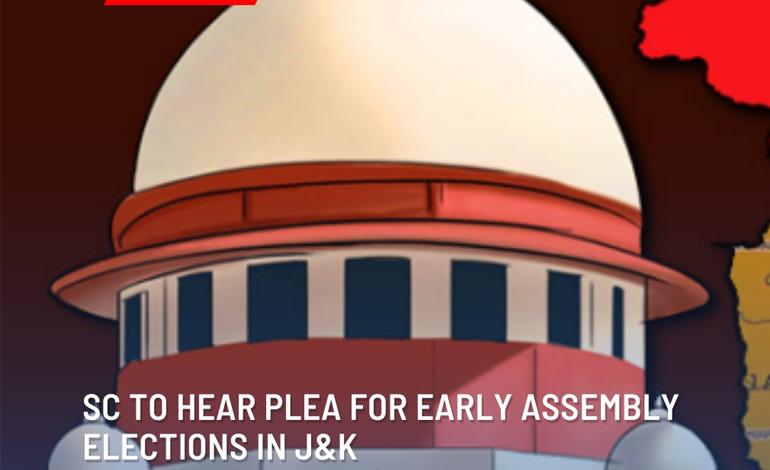In a significant development, the Supreme Court of India has agreed to hear a plea urging early assembly elections in the union territory of Jammu and Kashmir.

Introduction:
In a significant development, the Supreme Court of India has agreed to hear a plea urging early assembly elections in the union territory of Jammu and Kashmir. The plea highlights the importance of democratic processes and seeks to address the prolonged absence of an elected government in the region. As Kashmir continues on its path of transition, the call for the restoration of representative governance gains prominence. This article examines the plea and its potential implications for the region's political landscape.
The Context:
Jammu and Kashmir, a region that has witnessed its fair share of political challenges, underwent a significant constitutional transformation in 2019. The central government, invoking Article 370 of the Indian Constitution, revoked the region's special status and bifurcated it into two union territories – Jammu and Kashmir, and Ladakh. Since then, the region has been under the direct administration of the central government, with Lieutenant Governors appointed to govern the territories.
The Plea for Early Assembly Elections:
The plea before the Supreme Court seeks to address the absence of an elected government in Jammu and Kashmir, urging the court to direct the Election Commission to conduct assembly elections at the earliest. The petitioners argue that the prolonged imposition of central rule in the region undermines the principles of democracy and hampers the aspirations of the people.
Importance of Representative Governance:
The essence of democracy lies in the power vested in the people to choose their representatives through free and fair elections. The absence of an elected government in Jammu and Kashmir denies the residents their right to shape their own destiny through the ballot box. It is essential for the people to have a voice in governance and actively participate in decision-making processes that directly affect their lives.
Implications for Jammu and Kashmir:
The plea for early assembly elections holds significant implications for Jammu and Kashmir. First and foremost, it aims to restore democratic principles and ensure that the region's residents have a say in the governance of their land. By electing their representatives, the people can voice their concerns, address local issues, and contribute to the region's development.
Moreover, the restoration of representative governance can play a crucial role in building trust and fostering a sense of belonging among the people of Jammu and Kashmir. Inclusion and active participation in the political process can help bridge gaps, facilitate dialogue, and pave the way for lasting peace and stability in the region.
The Role of the Supreme Court:
The Supreme Court's decision to hear the plea for early assembly elections reflects its commitment to upholding democratic values and ensuring the welfare of the people. As the custodian of the Constitution, the court plays a vital role in safeguarding the rights and aspirations of citizens.
Conclusion:
The plea for early assembly elections in Jammu and Kashmir, now being heard by the Supreme Court, underscores the importance of democratic processes and the need for representative governance. By providing a platform for the people to elect their leaders, the region can take significant strides toward peace, stability, and inclusive development. As the court deliberates on the plea, its decision will have far-reaching consequences for Jammu and Kashmir, shaping its political landscape and defining the aspirations of its people.